How old are the oceans - Study guides, Class notes & Summaries
Looking for the best study guides, study notes and summaries about How old are the oceans? On this page you'll find 287 study documents about How old are the oceans.
Page 2 out of 287 results
Sort by

-
Solar System - Science Olympiad Questions and Answers Rated A+
- Exam (elaborations) • 31 pages • 2024
- Available in package deal
-
- $10.49
- + learn more
Solar System - Science Olympiad Questions and Answers Rated A+ How did the terrestrial planets form? In the proto-Solar-Sytem, after the sun formed, the rest of the materials orbiting close around it began to clump together too. However, closer to the sun, lighter materials like gases blew away and only rocky material was left, causing the four terrestrial planets, and some of their moons, to form. What are the characteristics of Terrestrial Planets? Solid bodies with a core surrounded...
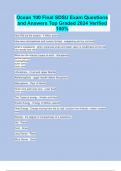
-
Ocean 100 Final SDSU Exam Questions and Answers Top Graded 2024 Verified 100%
- Exam (elaborations) • 14 pages • 2024
- Available in package deal
-
- $13.99
- + learn more
How Old are the oceans - 4 billion years How were atmospheres and oceans formed - outgassing and icy commets what is outgassing - when volcanoes erupt and water vapor is condensed and turned into clouds and rain What are the internal Layers of earth - lithosphere asthenosphere mesosphere outer core inner core Lithosphere - Crust and Upper Mantle Asthenosphere - upper mantle (below lithosphere) Mesosphere - Rest of Mantle Outer core and inner core - outer fluid inner so...
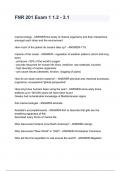
-
FNR 201 Exam 1 1.2 - 3.1 questions and answers
- Exam (elaborations) • 15 pages • 2024
-
- $7.99
- + learn more
marine biology - ANSWER-the study of marine organisms and their interactions amongst each other and the environment How much of the planet do oceans take up? - ANSWER-71% impacts of the ocean - ANSWER-- regulation of weather patterns (short and long term) - produces ~50% of the world's oxygen - provide resources for human life (food, medicine, raw materials, tourism) - high diversity of marine organisms - can cause issues (diseases, erosion, clogging of pipes) How do we study marine sy...

-
SCI 225 - Final Exam questions and answers
- Exam (elaborations) • 9 pages • 2024
- Available in package deal
-
- $12.99
- + learn more
SCI 225 - Final ExamLouis Agassiz - correct answer european alps glacier hypothesis (striation) HMS Challenger - correct answer The first major oceanographic expedition - fossils different in cold and warm areas Milutin Milankovitch - correct answer change in orbital parameters forces climate change related orbital cycles to ice ages frank libby - correct answer Carbon dating can be used to determine how old substances are Cesare Emiliani - correct answer Used sediment cores to esti...
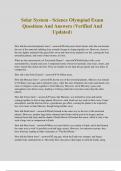
-
Solar System - Science Olympiad Exam Questions And Answers (Verified And Updated)
- Exam (elaborations) • 13 pages • 2024
- Available in package deal
-
- $12.49
- + learn more
Solar System - Science Olympiad Exam Questions And Answers (Verified And Updated) How did the terrestrial planets form? - answerIn the proto-Solar-Sytem, after the sun formed, the rest of the materials orbiting close around it began to clump together too. However, closer to the sun, lighter materials like gases blew away and only rocky material was left, causing the four terrestrial planets, and some of their moons, to form. What are the characteristics of Terrestrial Planets? - answerSol...
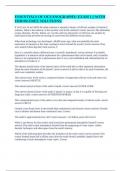
-
ESSENTIALS OF OCEANOGRAPHY: EXAM 1 || WITH ERROR-FREE SOLUTIONS.
- Exam (elaborations) • 5 pages • 2024
- Available in package deal
-
- $10.81
- + learn more
If 18.25 mL of an 0.0020 M iodate solution is rquired to titrate a 10.00 mL sample of vitamin C solution, What is the molarity of the ascorbic acid in the solution? correct answers The individual oceans (Atlantic, Pacific, Indian, etc.) on the earth are physically cut off from one another by land barriers that prevents the mixing of waters between different ocean basins. When boat technology was developed ~40,000 years ago, what was probably the main motivation for humans at this time wanting...
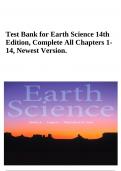
-
Test Bank for Earth Science 14th Edition By Edward J. Tarbuck, Complete All Chapters 1- 14, Newest Version.
- Exam (elaborations) • 637 pages • 2024
-
- $34.49
- + learn more
Test Bank for Earth Science 14th Edition By Edward J. Tarbuck, Complete All Chapters 1- 14, Newest Version. Chapter 1 Introduction to Earth Science 1) What are the basic differences between the disciplines of physical and historical geology? A) Physical geology is the study of fossils and sequences of rock strata; historical geology is the study of how rocks and minerals were used in the past. B) Historical geology involves the study of rock strata, fossils, and geologic events, utilizing ...
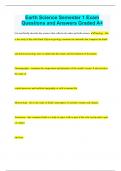
-
Earth Science Semester 1 Exam Questions and Answers Graded A+
- Exam (elaborations) • 30 pages • 2023
- Available in package deal
-
- $10.49
- + learn more
Earth Science Semester 1 Exam Questions and Answers Graded A+ List and briefly describe the sciences that collectively make up Earth science. Geology - this is the study of the solid Earth. Physical geology examines the materials that comprise the Earth and historical geology aims to understand the origins and development of the planet. Oceanography - examines the composition and dynamics of the world's oceans. It also involves the study of coastal processes and seafloor topography as well a...
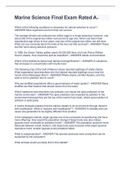
-
Marine Science Final Exam Rated A+
- Exam (elaborations) • 10 pages • 2023
- Available in package deal
-
- $12.49
- 1x sold
- + learn more
snails. Scientists studying these snails found that while 47 percent of the snail population was striped, 56 percent of the snails eaten by birds were striped. What could scientists conclude about the snails? - ANSWER Solid shell snail genes will increase in the population. The flesh-eating bacteria, Vibrio vulnificus, destroys healthy tissue. Infectious agents such as this are best classified as what kind of environmental factor? - ANSWER Pathogenic Between 1932 and 1968, a chemical facto...

-
Marine Biology Exam 1: Questions with Verified answers 2024
- Exam (elaborations) • 42 pages • 2024
-
- $14.49
- + learn more
What percent of the planet is covered by the ocean - 71% of the planet is covered by the ocean What percent of the oxygen from photosynthesis is produced in the ocean - 70-80% HMS Challenger - First comprehensive survey of the world's oceans (except the Arctic)-> The first major oceanographic expedition What are the four Major Ocean Basins - Pacific, Atlantic, Indian, Arctic The differences between the two hemispheres - Northern Hemisphere: most land masses Southern Hemisphere: "Sou...

Do you wonder why so many students wear nice clothes, have money to spare and enjoy tons of free time? Well, they sell on Stuvia! Imagine your study notes being downloaded a dozen times for $15 each. Every. Single. Day. Discover all about earning on Stuvia


